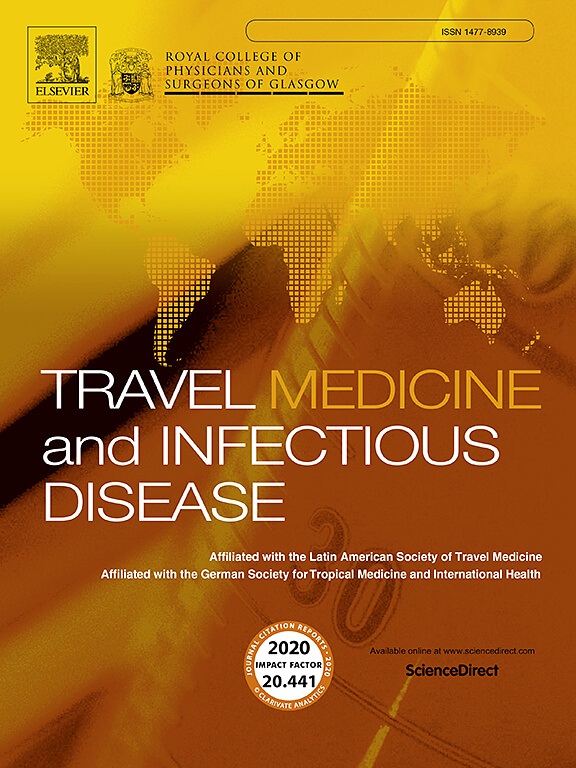奥米克龙感染对产妇和新生儿分娩结局的影响:一项回顾性队列研究。
IF 6.3
3区 医学
Q1 INFECTIOUS DISEASES
引用次数: 0
摘要
背景:方法:收集在我院分娩的382例孕妇(奥米克隆组136例,非奥米克隆组246例),记录孕妇和新生儿的人口学特征、疫苗接种情况、临床表现和用药情况、分娩结局等。比较了奥米克龙组和非奥米克龙组、急性感染组和非急性感染组的分娩结果,以探讨不良分娩结果与奥米克龙感染之间的关系:结果:奥米克隆组孕妇住院时间较长(6.3 ± 3.6 天 vs. 5.5 ± 2.3 天),产后 2 小时出血量较多(291.7 ± 104.9 mL vs. 262.7 ± 91.2 mL),新生儿转儿科率较高(20.6% vs. 2.8%),这可能与胎儿窘迫、产前发烧和肺炎/呼吸窘迫有关。因黄疸而转入儿科的新生儿在 Omicron 组中是独一无二的。发热孕妇的第二产程和住院时间更长,而咳嗽或祛痰孕妇的第三产程更短。受感染的孕妇是否处于急性期以及是否使用退烧药,分娩结果并无差异:结论:奥米克隆感染会增加产后 2 小时出血量和新生儿-儿科转院率。这些症状会影响产程和住院时间。然而,受感染的孕妇是否处于急性期或是否使用退烧药并不会影响分娩结果。本文章由计算机程序翻译,如有差异,请以英文原文为准。
Effect of omicron infection on maternal and neonatal delivery outcomes: A retrospective cohort study
Background
People are very concerned about the adverse effects of Omicron infection on delivery modes, duration of labor, and the postpartum status of pregnant women and neonates.
Methods
382 pregnant women (Omicron group: 136 cases; non-Omicron group: 246 cases) giving birth in our hospital were collected, demographic characteristics, vaccination, clinical manifestation and medication, delivery outcomes of pregnant women and neonates were recorded. Delivery outcomes were compared between the Omicron and non-Omicron groups, acute infection and non-acute infection groups to explore the relationship between adverse delivery outcomes and Omicron infection.
Results
Pregnant women in the Omicron group had a longer hospitalization time (6.3 ± 3.6 days vs.5.5 ± 2.3 days), more 2-hour postpartum hemorrhage (291.7 ± 104.9 mL vs.262.7 ± 91.2 mL) and higher neonatal-pediatric transfer rate (20.6 % vs. 2.8 %), which might be associated with fetal distress, prenatal fever and pneumonia/respiratory distress. Neonates transferred to pediatrics due to jaundice were unique in the Omicron group. Fever-pregnant women have a more prolonged second stage of labor and hospital stay while coughing or expectoration ones have a shorter third stage of labor. Delivery outcomes did not differ whether the infected pregnant women were in the acute phase and whether to use antipyretics.
Conclusion
Omicron infection can increase the 2-hour postpartum hemorrhage volume and the neonatal-pediatric transfer rate. The symptoms can affect the duration of labor and hospital stay. However, whether the infected pregnant women are in the acute phase or use antipyretics do not affect the delivery outcome.
求助全文
通过发布文献求助,成功后即可免费获取论文全文。
去求助
来源期刊

Travel Medicine and Infectious Disease
PUBLIC, ENVIRONMENTAL & OCCUPATIONAL HEALTH-INFECTIOUS DISEASES
CiteScore
19.40
自引率
1.70%
发文量
211
审稿时长
49 days
期刊介绍:
Travel Medicine and Infectious Disease
Publication Scope:
Publishes original papers, reviews, and consensus papers
Primary theme: infectious disease in the context of travel medicine
Focus Areas:
Epidemiology and surveillance of travel-related illness
Prevention and treatment of travel-associated infections
Malaria prevention and treatment
Travellers' diarrhoea
Infections associated with mass gatherings
Migration-related infections
Vaccines and vaccine-preventable disease
Global policy/regulations for disease prevention and control
Practical clinical issues for travel and tropical medicine practitioners
Coverage:
Addresses areas of controversy and debate in travel medicine
Aims to inform guidelines and policy pertinent to travel medicine and the prevention of infectious disease
Publication Features:
Offers a fast peer-review process
Provides early online publication of accepted manuscripts
Aims to publish cutting-edge papers
 求助内容:
求助内容: 应助结果提醒方式:
应助结果提醒方式:


